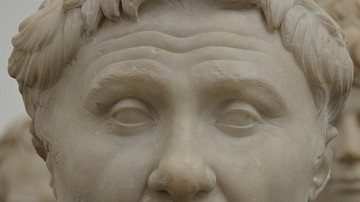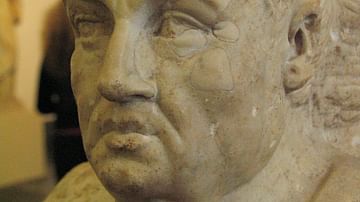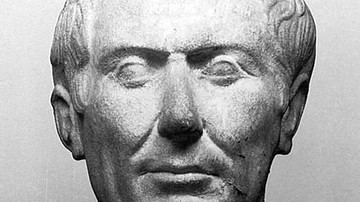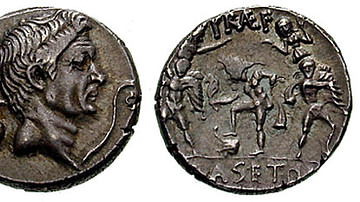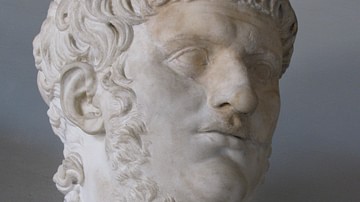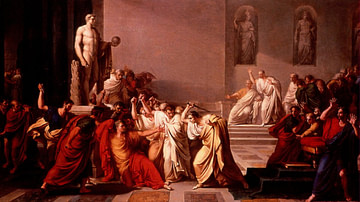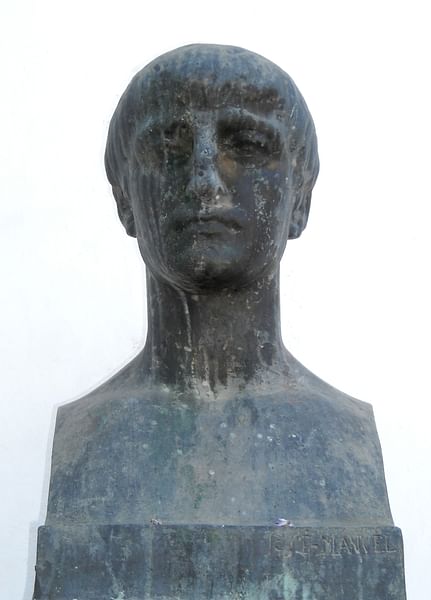
Marcus Annaeus Lucanus (39-65 CE), grandson of Seneca the Elder and nephew of Seneca the Younger, was a Roman statesman and Latin poet. Born in Corduba, he came to Rome as an infant and later held the positions of quaestor and augur. Lucan's elite education made him not only eligible to hold political office but also allowed him to indulge in the writing of literature, notably his Bellum Civile. He was a key figure within the inner circle of the Emperor Nero, a great patron of the arts.
Lucan's Poetry & the Bellum Civile
Lucan's poetic talents were highlighted when he was honoured with a prize at the first Neronian Games in 60 CE for a poem praising Nero. His literary output continued with the publication of part of his epic, the Bellum Civile, around 62-63 CE. It is for this historical poem that Lucan is most famous. Spanning ten books, it tells the story of the brutal civil conflict between Caesar and Pompey (49-45 BCE). The conflict erupted following the refusal of the Senate to allow Caesar to stand for a second consulship while absent from Rome, and the crossing of the Rubicon River by Caesar and his army. The war concluded with the defeat of the Republican side at the Battle of Munda, following the death of their leader Pompey in Egypt. However, Lucan's poem breaks off with Caesar still in Egypt before the ultimate conclusion of the conflict, thus leading to intense modern scholarly debate as to the completeness of the work.
The Bellum Civile is an incredibly complex work. The topic of civil war was somewhat taboo in Ancient Rome, and Lucan's decision to write about such a loaded subject has raised questions about his political motivations. Was he, despite his privileged position beside the emperor, a republican at heart? Lucan's violent, gory, and rhetorically flamboyant portrayal of the conflict might be interpreted as evidence for his resentment of what Rome had become under the Imperial system. However, his unflattering characterisation of Pompey, the Republican front man, casts doubt over this interpretation.
Despite his early favour, Lucan's relationship with Nero turned sour. Ancient sources debate the causes behind this. Suetonius, a Roman historian, attributes this deterioration to Nero walking out of one of Lucan's public readings, thus planting seeds of anger and resentment within the young poet. Tacitus, a Roman senator and historian, offers an alternative explanation, claiming that their relationship broke down due to Nero's jealousy of Lucan's poetic and artistic talents. Indeed, Tacitus pours scorn on Nero's own poetic works, suggesting that the emperor would pass off the jumbled lines of other poets as his own compositions. Although the exact reasons behind the declining relationship between Nero and Lucan remain unknown, we know that Lucan joined the Pisonian Conspiracy to overthrow Nero in 65CE. The ultimate aim of the conspiracy are not fully known. Did the group intend to overthrow the emperor, thus forcing a return to the Republican regime? Or did they merely wish to replace a tyrannical ruler with a more moderate figure? The discovery of the conspiracy ultimately led to the forced suicide of all involved. Tacitus provides a chilling account of Lucan's final moments:
He next ordained the despatch of Lucan. When his blood was flowing, and he felt his feet and hands chilling and the life receding little by little from the extremities, though the heart retained warmth and sentience, Lucan recalled a passage in his own poem, where he had described a wounded soldier dying a similar form of death, and he recited the very verses. Those were his last words. (Tacitus Annals XV.70)
Lucan's Legacy
Despite his brutal self-murder at such a young age, Lucan left behind an impressive legacy. His Bellum Civile offers an example of an epic that echoes canonical works such as Virgil's Aeneid, while also distancing itself artistically and ideologically from earlier epic poetry. Indeed, Quintilian, a Roman rhetorician, considered Lucan to be a better model for orators than poets, highlighting the unusual tone of his poetry. Lucan provides a window into the artistic world of the Neronian court, with the influences of rhetorical training, Stoic teaching, and youthful zeal clear within his writing. Despite this, Lucan was not studied as extensively as, say Virgil, until the late 20th century CE, when scholars began to bring Lucan to the forefront of academic discussion. A tantalisingly esoteric writer, Lucan will continue to challenge and inspire readers and scholars for many centuries to come.


